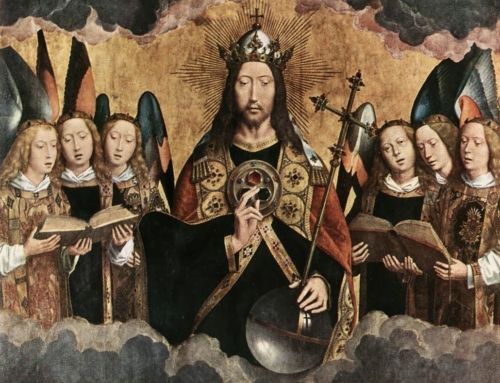“I know I have been forgiven because I’ve been to confession, but I don’t feel forgiven! How can I find peace and know that I’m forgiven? ”
This is one of the most frequent questions I get as a priest. A similar question comes up with the problem of forgiving others, “Father,” the person asks, “my business partner screwed me real bad. I’ve tried to forgive him, and I’ve given it all to God, but I still feel resentment and bitterness. I still want revenge. How can I find peace?”
With the temperature so high at the moment with the sin of sexual abuse by clergy, the topic is even more relevant. How can the victim find it in their heart to forgive the predator? Can the predator priest be redeemed and forgiven? How can that happen?
It’s tough. Real tough, and when a person says to me breezily about some offense, “Oh, It’s okay Father, I’ve forgiven and forgotten!” I think, “Well, I guess you’ve not really been hurt that badly then.” I know from experience that those who have been deeply wounded carry the wound for a long time and finding forgiveness is not simple.
Finding forgiveness means finding reconciliation, healing and peace for the victims first, but we also have a responsibility for the soul of the offender. How does that work? The victims and their advocates quite rightly want recognition of the sin and its severity and they are right in demanding repentance and reparation, but who decides where reconciliation, repentance and reparation end and revenge begins?
As Catholics the first step is confession and formal absolution. The offender takes that step and part of that step is owning the crime and accepting both forgiveness from God and the necessary reparation that must be made. This is the time for reality and facts. There is no room for a whitewash here, but there should also be no room for an emotional exaggeration of the crime. The severity should not be minimized, but neither should it be maximized.There are gradations of sin and we judge the actions and the person’s culpability according to gravity of the offense, circumstances, intentions and possible outcomes. A pre-meditated, continuing crime of a grave nature is worse than a few slip ups. There are crimes and there are misdemeanors.
If there is a crime against morality and church law the proper penalties must be enacted. If there is a crime in civil law the person should go to trial.
In a way, that part is easy. It’s formal. The action can be taken and if the proper action is taken the victims can know reparation has been made.
But that doesn’t deal with the emotions involved. The offender, if he or she is penitent, may accept God’s forgiveness but still feel guilty. No amount of reparation will take away their feelings of shame, guilt and remorse. The victim too, continues to feel wounded, angry and even bitter.
The facts of the matter are one thing. The feelings of guilt and anger are more difficult. The emotions are swirling around. They’re involuntary. You can’t control them. They control you. In fact they can control you and you can become enslaved to them.What’s to do about it? Reparation is necessary, but on its own it rarely satisfies the victim because it hasn’t dealt with the raw emotions. The only answer is in the difficult chemistry of forgiveness. Without forgiveness the only choice is to wallow in either guilt or rage.
Assuming that the facts of proper recognition, repentance and reparation have been made, the first step to finding the freedom of forgiveness for the offender is to remember the fact of forgiveness. If you have confessed and received absolution you are forgiven. It’s a fact. The first step is to claim that fact. Make it an act of your will and intellect. You might even say out loud to yourself, “I am forgiven. It’s a fact.” Imagine that resentment, sin, guilt and anger being washed away by a tsunami of God’s mercy.
The most difficult thing of all is that the victim must also find forgiveness. Yep. That’s what the line “Forgive us our sins as we forgive those who sin against us” is all about.
This is not easy because they are the victim, not the offender, but if they do not also find forgiveness, the wound will continue to fester. How does the person who has been wounded so badly find it in their heart to forgive?
I am convinced that it is impossible. When someone says to me, “Father, my ex wife really put the knife in me and twisted it. She kicked me out, got a quickie divorce, told everybody I was violent and having affairs (which was a lie) kept the house, kept the kids and is now married to her boyfriend. I want to forgive her but I can’t and it’s eating me up.”
He’s right. In human terms it is impossible. I remember that line in the gospel, “Only God can forgive sins.” The Pharisee was right. We can’t do it. But God can.
The only thing we can do at that stage is to allow God to forgive that person through us. It really is possible, by God’s grace, to hand it over and let him take care of it. This is not just an answer I think it is the only answer.
As Catholics we have a way to do this. We take it to Mass and offer it up.Both the offender and the victim in their own ways need to do this if they are to find inner peace and reconciliation.
There are various practical ways of doing this.First of all you need to ask yourself what Mass is actually for. What’s the purpose of Mass? Many Catholics have never asked that basic question, and if pressed they might say, “It is a chance to worship God together.” or “We come together to sing hymns, praise God and listen to his word and receive the Bread of Life.” or “Mass is the gathering place of the people of God around his Word and his table.”
What’s missing is the idea that Mass is a sacrifice. It is an offering. From the beginning of religious instinct in man the action of worship was the action of sacrifice. Humans offered to God the best gifts they had. However, in the Jewish religion this idea was expanded and the sacrifice also became a sin offering. The effect of sin was death, but the person’s sins were projected on to the animal which was sacrificed, and so the sins were forgiven. The price had been paid.
This primitive idea still lives within the idea of sacrifice of the Mass. The primary meaning of the Mass is that it is an offering of Christ’s once for all sacrifice, and that this offering applies the benefits of Christ’s sacrifice to our lives. Christ’s death was the payment for our sin. Once we see that the Mass is a sacrifice we can participate in the action of the Mass in a new and deeper way.
Therefore, when you come to Mass with a burden of guilt or a nagging desire for revenge or a sense of resentment and anger, you should bring that as part of your offering. See every part of the Mass as part of a greater offering to God.When you say the confession at the beginning of Mass imagine those resentments, that guilt and that feeling of not being forgiven gathered up into the prayer. When the collection is taken, don’t just put money in the basket–imagine that you are putting your negative feelings in the basket too. When the offertory gifts are brought forward in procession imagine that the person you resent is being brought forward and offered to God. Place all your dark feelings of guilt into those gifts being brought forward. Give God your frustration and fear and worry and anxiety.
As the priest lifts the bread and wine see him lifting all the unresolved negative emotions to God. In the action of the Mass the bread is taken, blessed, broken and transformed. So it is with the negative feelings that you offer up. Through the priest God will take them, offer them to God, bless them, break them and then they will be transformed. To get rid of those negative feelings of not being forgiven, see that first of all the priest takes them as you offer them up. Standing in the place of Christ the priest symbolically takes your burdens. As he does, think of Christ Jesus himself saying, “Come to me all who labor and are heavily burdened and I will give you rest.” Through the action of the Mass Christ will take those burdens. When I say Mass I make a conscious act of the will to bring to the altar all the sins I have heard in the confessional. Of course I don’t remember the individual sins. Instead, in a moment of silent prayer I ask that God will take them and forgive them and remember them no more, and that both the penitent and those he has offended will be set free, forgiven and healed.
Then the priest blesses the bread. Imagine that he is blessing the burdens you have. “Bless the burdens?” Yes, the dark times of our life will become blessings as they are transformed by grace. But first, like the bread, they need to be broken. The dark feelings have you in bondage, and as the bread is broken see the bonds being broken. Then the transformation of the bondage into blessing will be completed.
Finally, as you receive the body of Christ imagine that you are receiving in the most powerful way the peace and strength and knowledge of forgiveness from Christ himself.
This “liturgy therapy” might take some time to sink in. If your mind has been circling around and around over particular grievances or past sins it is possible that you have got into a destructive mental pattern. This negative downward spiral can only be reversed and countered by repeated positive cycles of receiving God’s forgiveness week by week.
I am convinced that faith works. In other words, our Catholic faith really does bring us to an abundant life–a life that is transformed from the inside out by God’s grace.Finally, it is in the darkest and most agonizing aspects of life that our faith is tested, but it is also at those points that once purified by the fire, the faith turns out to be gold.







thank you for this beautiful and necessary reminder of what forgiveness means. and your conclusion: “I am convinced that faith works” – it is true! but we need constant reminders!
What a beautiful way to help us bring our sins and burdens to God at Mass.
Thank you for explaining it in this way.